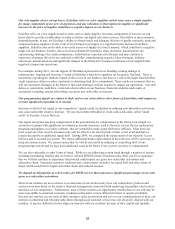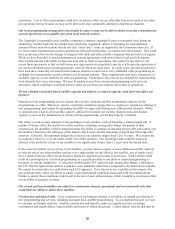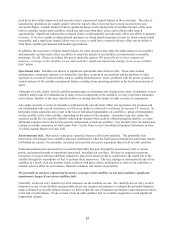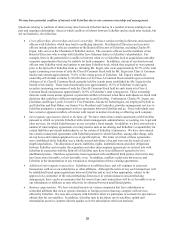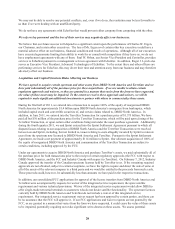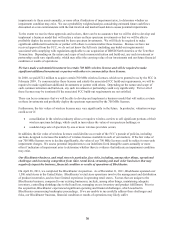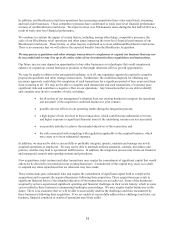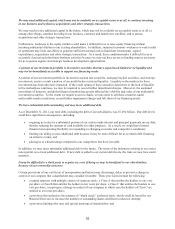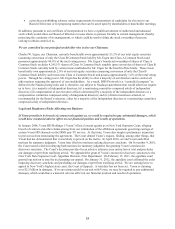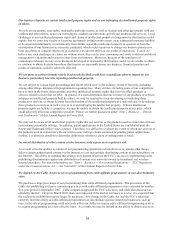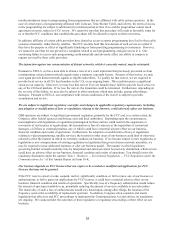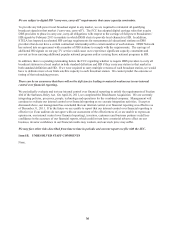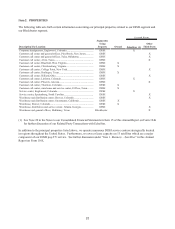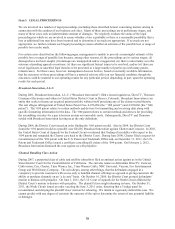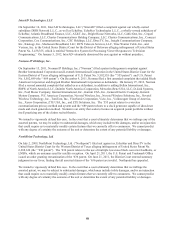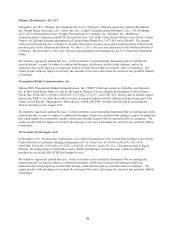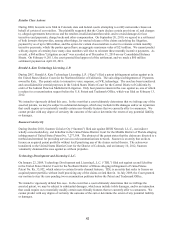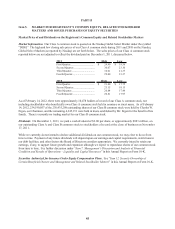Dish Network 2011 Annual Report Download - page 45
Download and view the complete annual report
Please find page 45 of the 2011 Dish Network annual report below. You can navigate through the pages in the report by either clicking on the pages listed below, or by using the keyword search tool below to find specific information within the annual report.35
35
nondiscriminatory terms to programming from programmers that are affiliated with cable system operators. In the
case of certain types of programming affiliated with Comcast, Time-Warner Cable, and Liberty, the terms of access
to the programming are subject to arbitration for a limited period of time if we and the programmer cannot reach
agreement on terms, subject to FCC review. We cannot be sure that this procedure will result in favorable terms for
us or that the FCC conditions that establish this procedure will be allowed to expire on their own terms.
In addition, affiliates of certain cable providers have denied us access to sports programming they feed to their cable
systems terrestrially, rather than by satellite. The FCC recently held that new denials of such service are unfair if
they have the purpose or effect of significantly hindering us from providing programming to consumers. However,
we cannot be sure that we can prevail in a complaint related to such programming, and gain access to it. Our
continuing failure to access such programming could materially and adversely affect our ability to compete in
regions serviced by these cable providers.
The injunction against our retransmission of distant networks, which is currently waived, may be reinstated.
Pursuant to STELA, we have been able to obtain a waiver of a court injunction that previously prevented us from
retransmitting certain distant network signals under a statutory copyright license. Because of that waiver, we may
once again provide distant network signals to eligible subscribers. To qualify for that waiver, we are required to
provide local service in all 210 local markets in the U.S. on an ongoing basis. This condition poses a significant
strain on our capacity. Moreover, we may lose that waiver if we are found to have failed to provide local service in
any of the 210 local markets. If we lose the waiver, the injunction could be reinstated. Furthermore, depending on
the severity of the failure, we may also be subject to other sanctions, which may include, among other things,
damages. Pursuant to STELA, our compliance with certain conditions of the waiver is subject to periodic
examination and review.
We are subject to significant regulatory oversight, and changes in applicable regulatory requirements, including
any adoption or modification of laws or regulations relating to the Internet, could adversely affect our business.
DBS operators are subject to significant government regulation, primarily by the FCC and, to a certain extent, by
Congress, other federal agencies and foreign, state and local authorities. Depending upon the circumstances,
noncompliance with legislation or regulations promulgated by these entities could result in the suspension or
revocation of our licenses or registrations, the termination or loss of contracts or the imposition of contractual
damages, civil fines or criminal penalties, any of which could have a material adverse effect on our business,
financial condition and results of operations. Furthermore, the adoption or modification of laws or regulations
relating to video programming, satellite services, the Internet or other areas of our business could limit or otherwise
adversely affect the manner in which we currently conduct our business. If we become subject to new regulations or
legislation or new interpretations of existing regulations or legislation that govern Internet network neutrality, we
may be required to incur additional expenses or alter our business model. The manner in which legislation
governing Internet network neutrality may be interpreted and enforced cannot be precisely determined, which in turn
could have an adverse effect on our business, financial condition and results of operations. You should review the
regulatory disclosures under the caption “Item 1. Business — Government Regulation — FCC Regulation under the
Communications Act” of this Annual Report on Form 10-K.
Our business depends on FCC licenses that can expire or be revoked or modified and applications for FCC
licenses that may not be granted.
If the FCC were to cancel, revoke, suspend, restrict, significantly condition, or fail to renew any of our licenses or
authorizations, or fail to grant our applications for FCC licenses, it could have a material adverse effect on our
business, financial condition and results of operations. Specifically, loss of a frequency authorization would reduce
the amount of spectrum available to us, potentially reducing the amount of services available to our subscribers.
The materiality of such a loss of authorizations would vary based upon, among other things, the location of the
frequency used or the availability of replacement spectrum. In addition, Congress often considers and enacts
legislation that affects us and FCC proceedings to implement the Communications Act and enforce its regulations
are ongoing. We cannot predict the outcomes of these legislative or regulatory proceedings or their effect on our
business.


